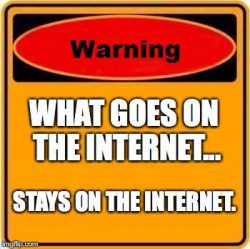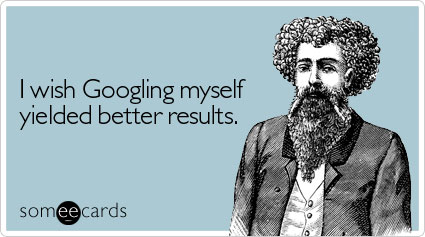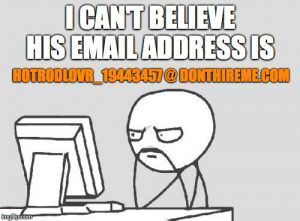Google Yourself Before Your Interviewer Does:
Seriously.
How many employers do you think look at your social media profile? The answer is: all of them. If you think employers and interviewers only check your references, you could be in trouble.
At this point in history, you’ve probably been Googled by someone other than yourself. And if you haven’t done much, or any, self-searching, this post is definitely for you. Even if you are Google savvy, you may not realize what information potential employers can, and will, find online.
The Society for Human Resources Management (SHRM) did a recent study showing that 1/3 of companies have disqualified a candidate based on online search results or social media content.
First and Fore-most
If you haven’t already, register an email address that uses most of your name in some variation (firstlast, first_last, lastfirst, etc), and doesn’t have a complicated string of numbers at the end. If Gmail doesn’t have what you’re looking for, try Yahoo, or Microsoft, or any number of other email hosts. Just please, and I mean please, use a professional email address.
Going Off the Grid
This may sound terrifying, or possibly relieving. But, it’s really not practical to eliminate your digital footprints. It may even appear sketchy if you don’t have an online presence. At the very least, You should be in control of what is, and isn’t, available for recruiters and employers to discover about your online identity.
Make The Grid work for You
Google Yourself
Including a Google Image search. Check the first few pages and make sure you don’t find anything you wouldn’t want to be seen by a potential employer. If you find something that conflicts with your professional goals and you didn’t post it, it may be tricky to get rid of. Try contacting the poster to see if the item can be removed. Otherwise, you may need to create your own content, like a personal website and additional social media profiles, to push the unwanted content further down the list.
If you don’t have a LinkedIn account, you need one. And, make sure it’s optimized correctly. If you set your profile up correctly, it is possible for recruiters and employers to Find You.
You don’t need a Facebook account for employment. But, if you have one, make sure it is set to Private and not Public. And, be conscious of what you post on other Facebook user’s pages. If you wouldn’t want an employer to see it, don’t post it. Also, to check content posted by other users before it goes live, activate Facebook’s Timeline Review.
Use Twitter for good. Follow companies, recruiters, and relevant hashtags to your industry. Use tweets, retweets, keywords, and comments about industry related topics to network and demonstrate interest and knowledge in your field.
Blogs and Groups
Find professionally relevant Blogs and online groups to be a part of and contribute to. These are great opportunities to show your investment in your field, and interest in personal professional growth.
What Employers Shouldn’t See
- Drug or Alcohol use
- Unprofessional, or compromising photos
- Posts that use harsh, or abusive language
- Negative content toward former employers or employees
- Resume, Employment, or Personal information discrepancies
- Any criminal activity or history
Dating Sites
Yup, they see those too. In fact, the SHRM posted an article about a potential candidate being disqualified because of a photo sent by the candidate to the hiring manger’s friend, in an unrelated dating site interaction.
Conclusion
Be pro-active with your online presence. Bring the relevant details you want to be seen by employers to the top of the list, and the ones you don’t far, far away.


